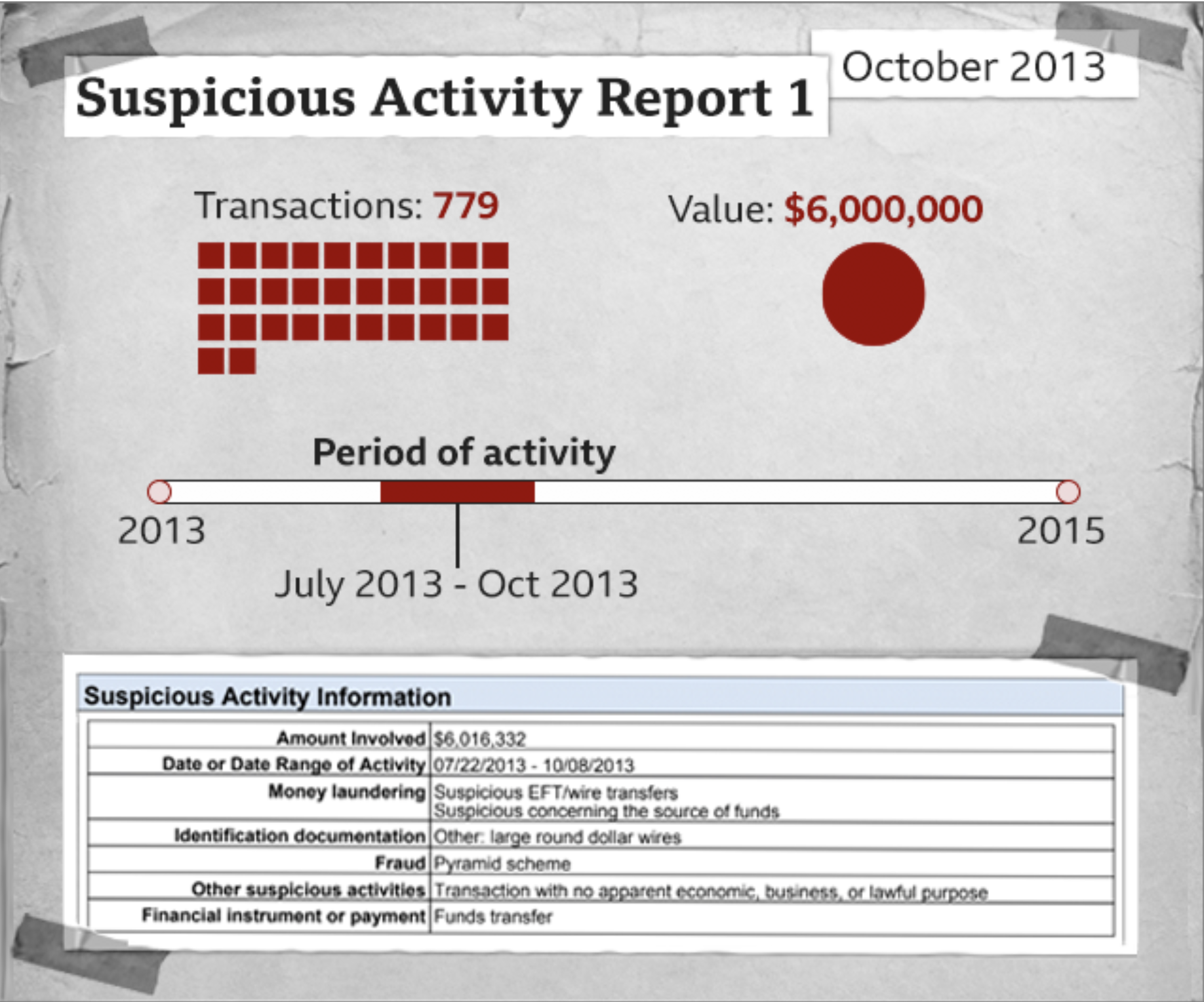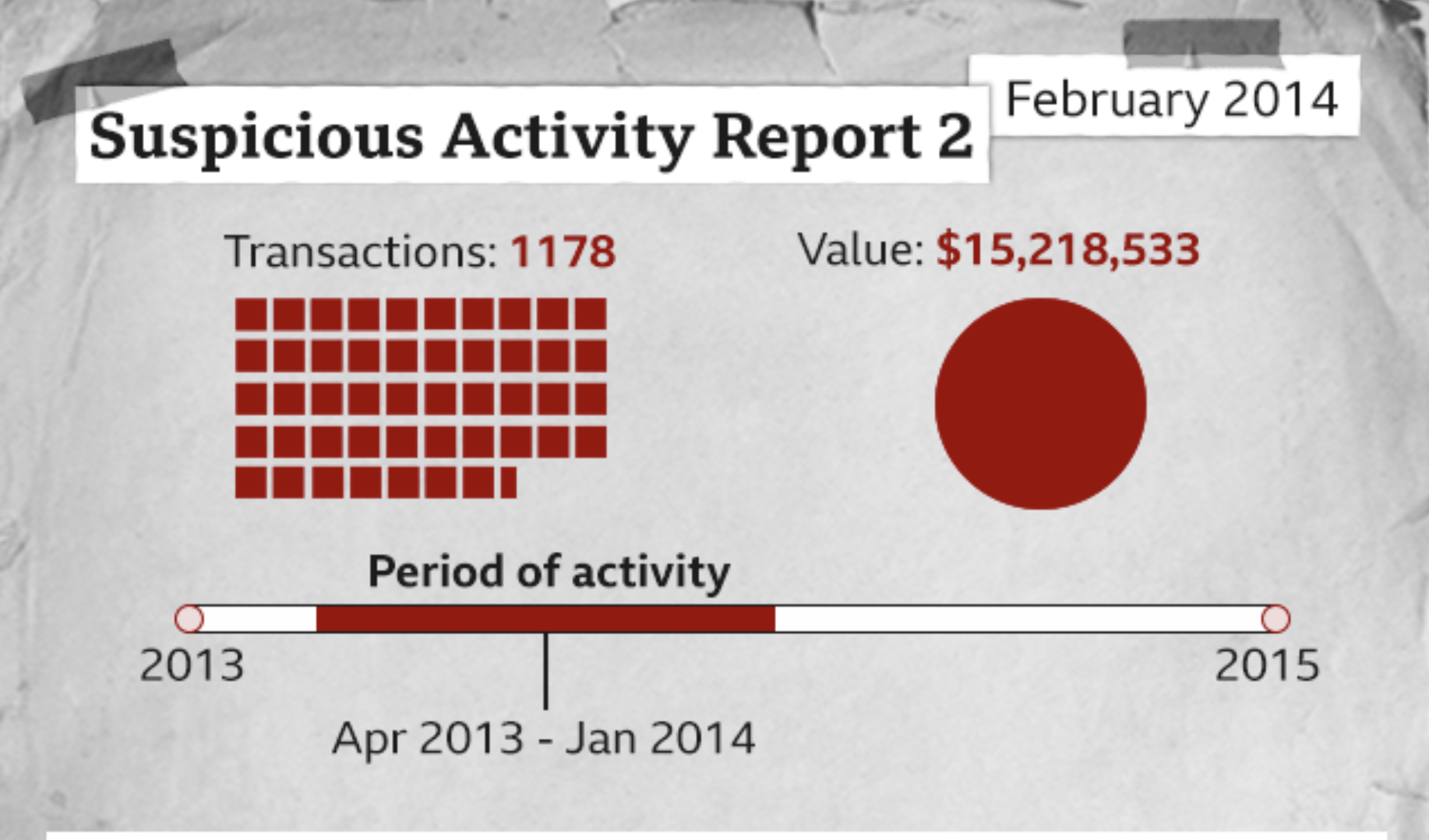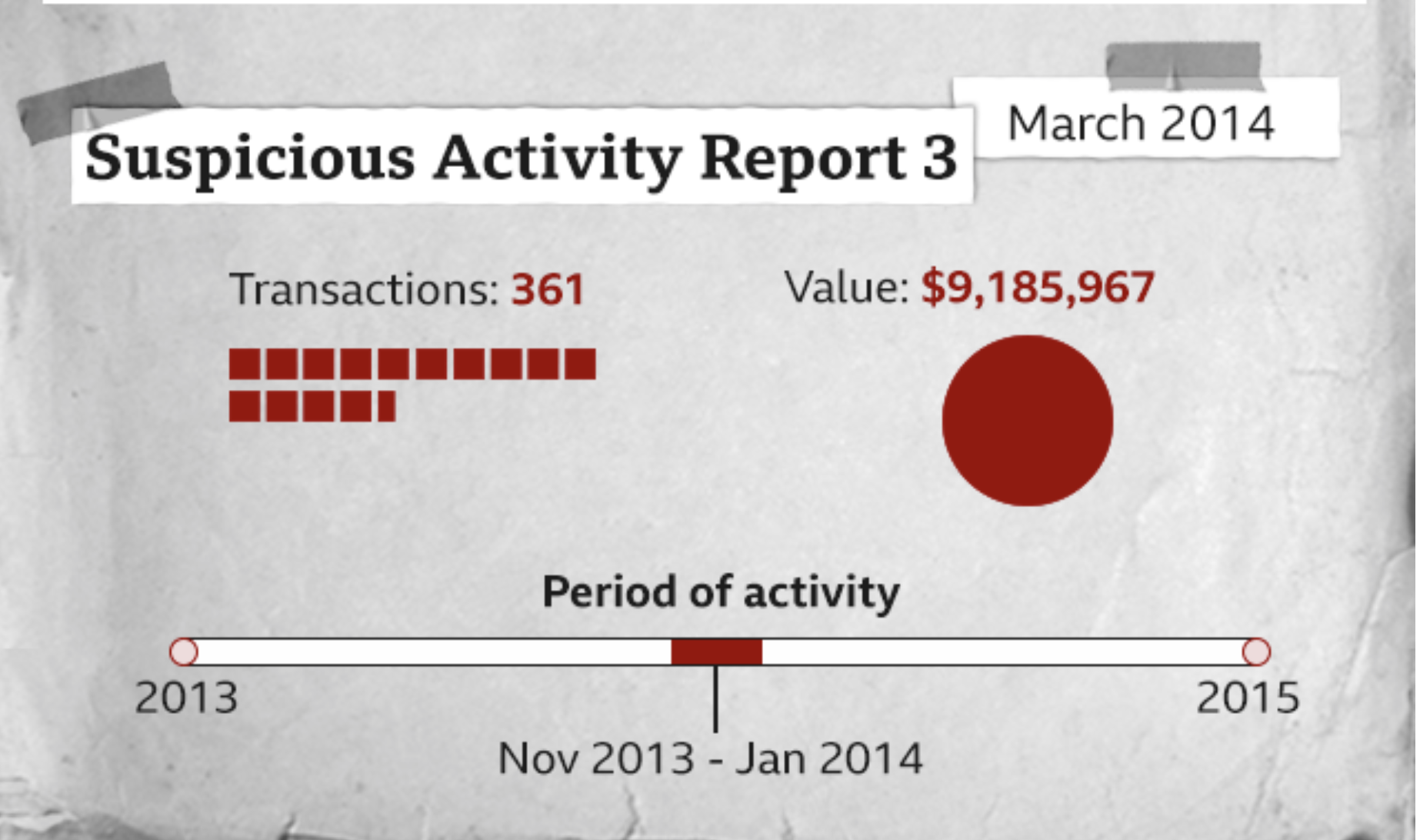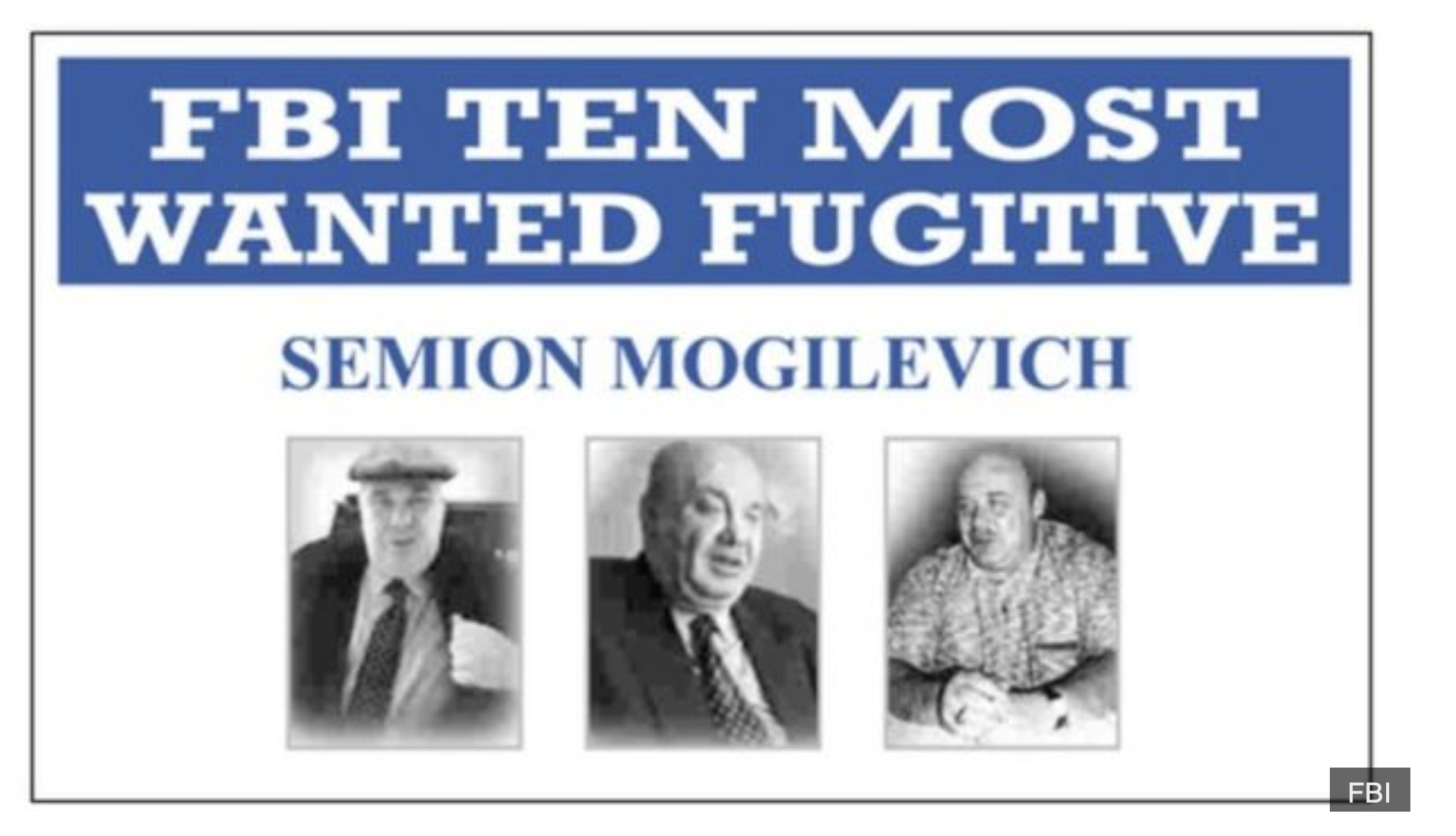
HSBC moved scam £62 million
Britain’s biggest bank HSBC allowed fraudsters to transfer millions of dollars around the world despite learning their scam, leaked secret files reveal. HSBC moved the money through its US business to HSBC accounts in Hong Kong in 2013 and 2014.
Its role in the $80m ( £62m) fraud is detailed in a leak of 2657 documents banks’ “suspicious activity reports” that have been called the FinCEN Files, a th4 heart of which are 2, 100 suspicious activity reports or SARs. SARs are not evidence of wrongdoing – banks send them to authorities if they suspect customers could be up to no good.
BY law they have to know who their clients are- It’s not enough to file SARs and keep taking dirty money from clients while expecting enforcers to deal with the problem. If they have evidence of criminal activity they should stop moving the cash.
The leak shows how money was laundered through some of the world’s biggest banks and how criminals used anonymous British companies to hide their money. The SARs were leaked to the Buzzfeed website and shared with the International Consortium of Investigative Journalists (ICIJ). The ICU led the reporting of the Panama Papers and Paradise Papers leaks- secret files detailing the offshore activities of the wealthy and the famous.
Ferus Shiel from the consortium said the FinCEN Files are an “insight into what banks know about the vast flows of dirty money across the globe. The system that is meant to regulate the flow of tainted money is broken”.
The leaked SARs has been submitted to the US Financial Crimes Investigation Network or Fin CEN between 2000 and 2017 and cover transactions worth about $2trillion.
Ponzi Scam
The Investment scam that HSBC was warned about was called WCM777. It led to the death of investor Reynaldo Pacheco, signed up to the scheme, and was expected to recruit other investors with the promise that everyone would get rich, was found underwater on a wine estate in Napa, California in April 2014. Police say he had been bludgeoned with rocks.
A woman Mr. Pacheco, 44, introduced lost about $3, 000 and led to the killing by men hired to kidnap him.
The scheme was started by Chinese national Ming Xu, who claims he came to the US to study MA in California. Xu or Dr. Phil acted as a pastor at evangelical churches basing himself in the Los Angeles area. Xu has been operating a global investment bank, World Capital Market, that would pay 100 per cent profit in 100 days. In reality, he was running the WCM777 Ponzi scheme.
Through travelling, seminars, Facebook, Webinars on YouTube it raised $80m selling supposed investment opportunities in cloud computing.
The fraudsters used Christian imagery and targeted poor communities in the US, Columbia, and Peru including the UK.
Regulators in California told HSBC it was investigating WCM777 as early as September 2013 and alerted its residents to the fraud. California, Colorado, and Massachusetts took action against WCM for selling unregistered investments.
HSBC did not spot suspicious transactions going through its systems/, But not until April 2014, after US financial regulator the Securities and Exchange Commission filed charges that the WCM777 accounts HSBC in Hong Kong were shut by which time there was nothing left in them.
HSBC filed its first SAR about the scam on 29 October 2013 relating to more than $6m sent to the fraudsters’ accounts in Hong Kong.
Bank officials said there was no apparent economic business or the lawful purpose for the transactions and noted allegations of Ponzi scheme activities.
 A second SAR in Feburary 2014 identified $15.4m in suspicious transactions and potential Ponzi scheme.
A second SAR in Feburary 2014 identified $15.4m in suspicious transactions and potential Ponzi scheme.
 The Third report in March related to a company associated with WCM777 and nearly $9.2m and noted the regulatory moves by US states and an investigation ordered by Columbia’s president.
The Third report in March related to a company associated with WCM777 and nearly $9.2m and noted the regulatory moves by US states and an investigation ordered by Columbia’s president.
The WCM777 scheme emerged months after HSBC avoided a US criminal prosecution over money laundering by Mexican drug barons and did so by agreeing to improve procedures.
Analysis by the ICU shows that between 2011 and 2017 HSBC identified suspicious transactions moving through accounts in Hong Kong of more than $1.5bn about £900m linked to overall criminal activity, although the report excluded key facts about customers, including the ultimate beneficial owners of accounts and where the money came from. Banks are not allowed to talk about suspicious activity reports.
HSBC however, says it has always met its legal duties on reporting such activity.
HSBC said, “Starting in 2012, HSBC embarked on a multi-year journey to overhaul its ability to combat financial crime across more than 60 jurisdictions. HSBC is a much safer institution that it was in 2012”.
The bank also said the US authorities had determined that it “met all of its obligations under the agreement struck with US prosecutors.”
Xu was eventually arrested by the Chinese authorities in 2017 and jailed for three years over the scam.
A Ponzi scheme named after early 20th-century conman Charles Ponzi – does not generate profits from the cash it raises. Instead investors are paid a return from money coming in from other new investors. As the scheme grows more and more people are needed and it eventually collapses. Meanwhile, the owners of the scheme move money into their own accounts.
The files reveal the investment scam, known as a Ponzi scheme, started soon after the bank was fined $1.9 bn (£1.4 bn ) in the US over money laundering. It had promised to clamp down on these sorts of practices.
The lawyer for the duped investors says the bank should have acted sooner to close the fraudsters’ accounts.
 The document’s leak includes other revelations such as the suggestion one of the biggest banks in the US may have helped a notorious mobster to move more than $1bn. The FinCEN Files also show how multinational bank JP Morgan may have helped a man known as the Russian Mafia’s boss of bosses to move more than $$1bn through the financial system. Semion Mogilevich has been accused of crimes including gun-running, drug trafficking, and murder.
The document’s leak includes other revelations such as the suggestion one of the biggest banks in the US may have helped a notorious mobster to move more than $1bn. The FinCEN Files also show how multinational bank JP Morgan may have helped a man known as the Russian Mafia’s boss of bosses to move more than $$1bn through the financial system. Semion Mogilevich has been accused of crimes including gun-running, drug trafficking, and murder.
He should not be allowed to use the financial system, but a SAR filed by JP Morgan in 2015 after the account was closed, reveals how the bank’s London office may have moved some of the cash.
It also details how JP Morgan provided banking services to a secretive offshore company called ABSI Enterprises between 2002 and 2013 even though the firm’s ownership was not clear from the bank’s records. Over five year period, JP Morgan sent and received wire transfers totalling $1.02bn the bank said.
In a statement, JP Morgan said:” We follow all laws and regulations in support of the government’s work to combat financial crimes. We devote thousands of people and hundreds of dollars to this important work.”
Lubov Chernukhin, the Husband of one of the Conservative Party’s biggest donors was secretly funded by a Russian oligarch with close ties to President Putin.
Lubov Chernukhin has given £.1.7m to the Tories, including paying to spend time with the last three prime ministers. Leaked files also reveal her husband received $8m (£6.1m), the money initially came from a politician facing US sanctions due to his closeness to the Kremlin.
Her lawyers, however, say the donations are not tainted by Kremlin’s influence. A leak of the banks “ suspicious activity report shows Vladimir Chernukhin was sent the money in 2016 from a British Virgin Islands company linked to Suleyman Kerimov.
Officials at Deutsche Bank in New York reported it as being among $278.5m of transactions involving the offshore company. Billionaire Mr. Kerimov is the owner of Russia’s biggest gold mine and a member of the upper chamber of the Russian Parliament. He has been under investigation in France over allegations of tax fraud since 2016. In 2018, he was sanctioned by the US authorities, who were targeting those they said: “play a key role in advancing Russia’s malign activities.”
Mr. Chernukhin (52), is a former deputy minister of finance under Vladimir Putin who left Russia for London in 2004 after being sacked by the president.
Mrs. Chernukhin’s donations to the Conservative Party began in 2012 and more than $1.5m came after the $8m payment linked to Mr. Kerimov was made to her husband on 29 April 2016, although it is not clear if any of that cash went to the Tories.
In return for £135, 000 she was invited to a ladies’ night dinner at a luxury hotel with Prime Minister Theresa May’s cabinet in April 2019.
